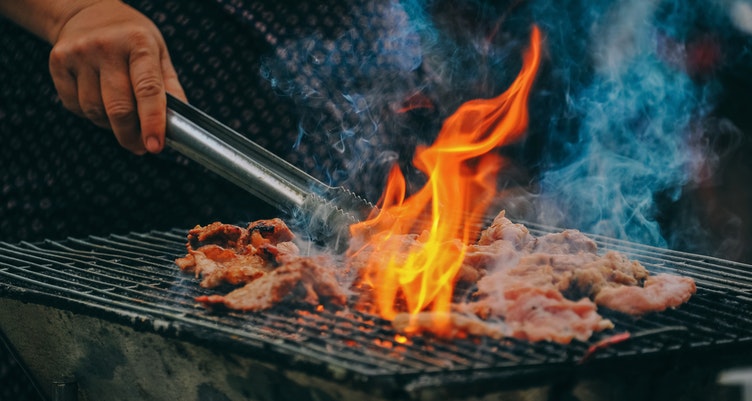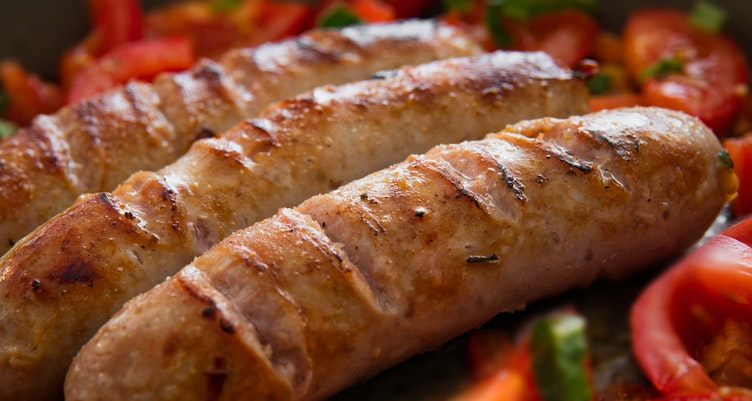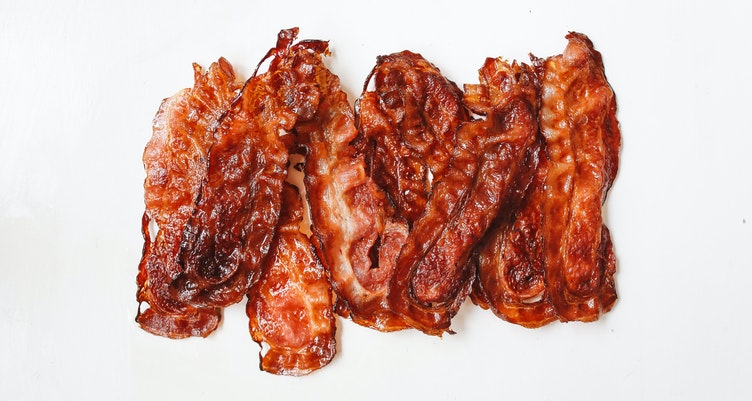Grilling This Weekend? Here’s What to Know About Nitrates

- Nitrates are naturally occurring compounds found in foods and produced by your body. They’re used as preservatives to keep meat products like bacon, hot dogs, sausages and jerky from spoiling.
- The problem is, nitrates and nitrites convert into nitrosamines, which have been linked to health risks.
- Minimize nitrates by grilling fresh organic meat such as chicken, pork and 100% grass-fed beef like steak or hamburger.
You might have heard that nitrates in meat aren’t great. You don’t tend to think about this until grilling season starts and you head to the grocery store. That’s when the question tends to pop up in the back of your mind: What meats have nitrates? Why are they such a big deal?
What are nitrates (and nitrites)?

When you see “nitrates” on the list of ingredients, this typically refers to both nitrates and nitrites. These are compounds naturally found in foods, such as some vegetables and processed meats. Your body also produces nitrates.
Some science: Nitrates (NO3) and nitrites (NO2) are simple organic compounds made of nitrogen paired with two or three oxygen atoms. They have been used in foods for centuries. They’re typically paired with potassium or sodium to create a compound that binds with the chemicals in meat to inhibit the growth of bacteria.
Have you ever wondered why cured meats like beef jerky and salami stay red? The red pigment in meat is called myoglobin. It binds with oxygen in order to supply it to the muscles. Fresh-cut meat remains red while it’s fresh, but once it’s been around awhile, the oxygen-myoglobin bonds start to break down, and the meat turns grayish-brown. Nitrites bind to the myoglobin with an even stronger bond than oxygen, keeping the meat red even longer.[1]
While fresh, red meat looks good, the biggest benefit of nitrates is their ability to preserve meat. In the Middle Ages, people would use a form of nitrate called saltpeter to preserve their meat. Nitrates can actually prevent meat from going rancid by impeding the growth of bacteria, including C. botulinum bacterial spores.[2]
Are nitrates bad for you?

The evidence reveals that dietary nitrates are linked to health risks. Studies show that people who eat even small amounts of nitrates on a regular basis have increased instances of colon and stomach cancers.[3]
The nitrate intake itself isn’t the problem. In the process of digestion, nitrates typically lose an oxygen molecule (adding to your body’s oxidative stress) and become nitrites. Scientists are finding that nitrites transform into dangerous nitrosamines when they pick up secondary amines from protein as it cooks. These nitrosamines generate oxidative stress and inflammation.[4]
The thing is, food producers will add high levels of nitrates to processed meats in order to help preserve them. If you regularly eat processed meats, you increase your risk of health problems. And unfortunately, the most popular foods to throw on the grill this weekend are packed with nitrates — think hot dogs and sausages.
What foods contain nitrates?

Sources of nitrate include natural foods like celery, spinach, kale and cabbage. Even meats labeled as “uncured” or “no nitrites added” can contain nitrates that come from celery, beets or another natural source that is used in the curing process.[5]
Whether sourced from nature or from man-made sodium nitrite, the molecule is the same — and it’s just as inflammatory when cooked with protein.
To limit the formation of nitrosamines, food manufacturers add either ascorbic acid or sulfur dioxide to packaged meats. Both of these chemicals have the ability to stop or reduce the number of nitrosamines from forming as you cook your meat.[6]
Besides the usual offenders like bacon, hot dogs and cold cuts, you can get good at recognizing other processed meats high in nitrates. Just ask yourself these questions:
- Does that meat need refrigeration?
- Is that meat raw or already cooked?
- Is that meat a natural shade of red?
These questions will help you identify meats that are preserved with high amounts of nitrates, such as jerky, meat sticks, hot dogs and sausages.
How to avoid nitrates and grill healthier

The bottom line for avoiding nitrates is to avoid regularly eating processed meats like bacon, jerky, hot dogs, sausages and cold cuts. If you’re looking forward to an evening of healthy backyard grilling, choose organic, pasture-raised meat such as chicken, pork and 100% grass-fed beef. And whenever you’re enjoying party food and drink, keep fast-acting Coconut Charcoal in your back pocket to help your body eliminate toxins.
You can minimize oxidation by trimming off the fat, turning the meat more often and cooking your meat at lower temperatures — and be sure not to char it. Better yet, cook vegetables like bell peppers and squash to eat on the side. These veggies are delicious off the grill and they’re high in vitamin C, which inhibits the production of nitrosamines. And more veggies in your diet is always a good thing.
Sign up for early access to sales, product launches, the latest Bulletproof news and more!



